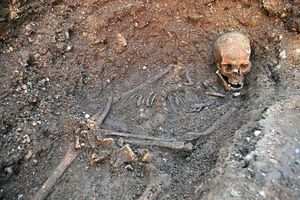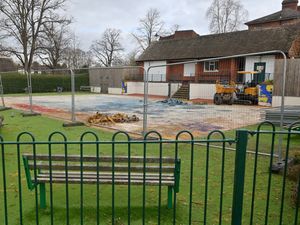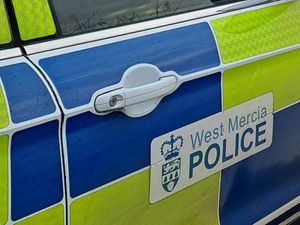Ludlow's part in the life of a rediscovered king
He was the last Plantagenet king and was to die in battle and be hastily buried – only to be rediscovered centuries later under a council car park.

And as Leicester makes its final preparations to give Richard III a reburial which is fit for a king, a researcher and author has told of the Shropshire links of this fascinating medieval figure.
A week of events is culminating in the reburial of Richard III on March 26 in Leicester Cathedral.
It was over two years ago that his bones were rediscovered by archaeologists under a car park in the heart of the city.
His reburial was delayed by a legal challenge by campaigners urging that he should be buried at York.
Kristie Dean has researched places associated with Richard's life in her new book "The World of Richard III", which has been published to coincide with the reburial.

And she reveals he would have known Ludlow, a place where an event took place which shaped his life.
Ludlow Castle was both a stronghold and a favoured family residence at the time, she says, and the town would have had both happy and sad memories for Richard, who was the son of Richard, Duke of York, and Cecily Neville.
"It was here that the Duke of York set up a separate household for his older sons, Edward, Earl of March, and Edmund, Earl of Rutland. Although little is known of Richard's movements in his younger years, it is likely that he visited Ludlow as a young child," she said.
"Richard and his family would have had chambers in the north range of the castle. The great hall of the range is immense, giving credence to its former stateliness. The Duke of York and Cecily would have sat upon the dais at the upper end of the hall, and a warm fire would have burned on an open hearth in the centre of the room.
"The solar wing and chamber blocks are on either side of the hall, and this is where Richard would have slept.
"The chapel of St Mary Magdalene was also an important place within the castle."

"Round naves were built to imitate the church of the Holy Sepulchre in Jerusalem, and Ludlow's chapel contains rich, well-ornamented decorations.
"As religion played a large role in his family's life, Richard would have spent time within this chapel's walls
"When Richard was young, an event at Ludlow would have a large impact on his life. A council had been called in Coventry in June 1459, to which his father and associates had not been invited.
"The duke retreated to Ludlow with his allies, and mustered a force here. Initially he wanted to maintain a defensive position in the hopes of gaining an audience with the king. Ultimately, this did not happen, and the Duke of York and his two eldest sons fled into exile. The Duke of York and Edmund went to Ireland, while Edward fled with the Nevilles to Calais.
"Duchess Cecily stayed behind at the castle with Richard, George and Margaret.
"During the sack of the town by the royalist forces, she and her children would have been protected. Still, this had to be a traumatic experience for Richard as his father fled and royalist troops sacked the town.
"Ludlow would contain both happy and sad memories for the future king. Following the rout at Ludford Bridge, Duchess Cecily and her three youngest children would be placed under the custody of her sister, who was married to the Lancastrian Duke of Buckingham.
"Today, the church of St Laurence celebrates Ludlow's ties to the York family with a beautiful stained-glass window containing depictions of the Duke of York, Edward IV and Edward V."
And that's not the only link between King Richard and Ludlow.
For the enduring mystery of the Princes in the Tower also involves the castle.
The princes - the sons of Edward IV - were Edward, who was born in London, and Richard, who was born in Shrewsbury.
Edward IV, who became king through the Wars of the Roses, died suddenly on 9 April 1483 and his eldest son - just 13 - was proclaimed Edward V at Ludlow Castle.
His father's brother, Richard, Duke of Gloucester, was named as protector.
Edward travelled to London, where he and his 10-year-old brother were lodged in the Tower of London.
The boys were declared illegitimate and that July Richard, Duke of Gloucester, was crowned Richard III.
The boys were never seen again, and although there is no direct proof of Richard's involvement in their deaths, it is widely believed that he had them murdered.





